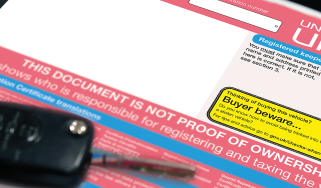How to sell a deceased person’s car: step-by-step process explained
If you’re looking to sell a car after the death of its owner, our guide will help you through the process

After the death of a loved one, many of us revert to autopilot when dealing with the unfortunate necessity of handling the administrative details that follow – they’re simply tasks that must be done while our minds are on other things.
Selling their car is one such task, and we’ve created this guide that explains all the basics of selling a deceased person’s car. We cover what you should know, and how to deal with all the necessary paperwork and any issues that might arise, though this guide does not constitute legal advice.
Can I sell a deceased person’s car?
Yes, you can sell a deceased person’s car, and in some respects the process isn’t that different from selling a car in any other circumstances – there are just a few extra steps to consider.
What to consider when selling a deceased person’s car
Before selling a deceased person’s car, there are a few things you’ll need to consider, both to make the process go smoothly, and to ensure you’re legally in a position to sell the car. These are as follows:
Legal entitlement
In order to sell a deceased person’s car, you must be legally able to do so. If you are unsure of your legal entitlement, you should first seek professional legal advice before proceeding any further.
Insurance coverage
If you are legally entitled to sell the car, it’s likely you’ll need to drive it at some point, whether to move it to a new location or during the selling process. For this you’ll need to be insured on the car, and this may require taking out new insurance, even if you were a named driver on the deceased person’s policy – as policies typically end when the policyholder passes away. It is wise to take out an insurance policy even if you won’t be driving the car though, to ensure it’s still covered against fire, theft, or third-party damage.
Relationship to the deceased
Your relationship to the deceased again plays into your legal entitlement to sell their car, since a spouse will have a different legal status to a parent, or a sibling, or a cousin. You should again consult legal counsel to ensure there are no problems here.
How to sell a deceased person’s car
For the purposes of this guide, we are assuming that the three considerations above have been taken into account, and you are indeed legally able to sell the car in question.
Your next step then is the process of ensuring the car can be sold, and then going through the steps just as you would if you were selling your own vehicle.
Telling DVLA of the car owner’s death
The first step in the process is to inform the DVLA that someone has died, so their driving licence can be cancelled, they can be removed as the registered owner of any vehicles, and their VED road tax can be cancelled where necessary.
You can do this with a letter to the DVLA (addressed to DVLA, Swansea, SA99 1AB) including your relationship to the person who died, the date they died, and their name, address, and date of birth.
Alternatively, you can use the government’s Tell Us Once service, which will automatically contact the DVLA and inform them, as well as conveniently doing the same for other services such as the Passport Office, HMRC, and the local council, among other services.
As with the insurance coverage mentioned earlier, once the deceased is no longer considered the registered keeper of a vehicle, that registration, and its tax burden, must be transferred. We will cover this more in the V5C logbook section further down.
Checking for outstanding finance
If the car still has outstanding finance, you will not be able to sell it straight away. If this is the case, you’ll need to get in contact with the finance provider, which will probably be recorded on a document somewhere in the paperwork for the vehicle.
Car finance terms typically have a death clause which will lay out the repayment process should the contracted owner die before the car is paid off. If there is a co-signer then they will become liable for the debt, but otherwise UK law states that debts will be paid out from the deceased’s estate.
In some cases the finance provider may provide the option for them to take back the car in lieu of its new keeper continuing to pay off the finance terms – in which case, selling the car privately is no longer a concern.

Gathering the necessary documents
Unfortunately cars aren’t exempt from the mountain of paperwork you typically have to go through after someone passes away, but below are the four most important documents you’ll need to locate before beginning the process of selling a deceased person’s car.
V5C logbook
The V5C logbook document accompanies every car and links it to a registered keeper. As a car cannot be registered to someone who is deceased, you will need to inform the DVLA (as detailed above) to have the car registered to a new keeper, such as yourself or someone in your family. This can be done using the GOV.UK website, or by filling-in the appropriate section of the V5C (section 2, or section 6 for pre-April 2019 documents) and sending it to the DVLA.
Death Certificate
You may need to prove the original owner’s identity in order to sell a car, especially to a dealer, so you will need the deceased person’s death certificate for this purpose.
Grant of probate
This is a legally-binding document that gives you the authority to manage a deceased person’s estate – in other words, it means you are legally able to sell their possessions, including cars.
MOT certificate
You can sell a car without an MOT, but as a certificate of roadworthiness, it will certainly make things easier by reassuring a buyer that the car is in good working order.
Determining ownership and liens
Having the V5C logbook is proof of registration, but it is not proof of ownership of the vehicle. If the deceased was not the car’s owner, then you will need to seek permission from the actual owner of the vehicle if you are to sell the car. Likewise, you must make sure the car has no outstanding payments or liens on the car, if the owner is a finance company rather than an individual.
Valuing the car
Assuming all of the above is present and correct, then the process to follow is much like selling any other car in happier circumstances. That starts with determining the car’s value, which is subject to numerous factors, from the type of car, to its age, mileage, condition, colour, number of previous owners, options, and more.
There are a few ways you can value a car, from going online to see what similar models are being advertised for, or using a service our Auto Express car valuation tool which will give you a ballpark figure for the car based on some of the aforementioned details.
Remember that damage, a missing V5C logbook, and an expired MOT will all reduce the value of a car, so if you’re in a position to correct all these factors, it may be worth doing if you want to maximise the asking price.
Selling the car
Providing you have the legal ability to do so, selling a deceased person’s car doesn’t change much from selling a car in other circumstances, so if you’ve sold a car before, you’ll be mostly familiar with the process. There are just one or two small differences, which we’ve detailed below.
Selling to a dealer
Selling to a dealer isn’t much different from in any other scenario, but a dealer buying the car may want to see proof that the car is yours to sell, and may wish to see the death certificate of the deceased person as a result, or a letter from the solicitor of the estate granting you authority to sell the car. Beyond this, you and the dealer will fill out and retain the relevant sections of the V5C as normal.
Selling it privately
To sell the car privately you’ll need to take photos of the car and then write a short, descriptive advertisement containing relevant details about the car, including any servicing work done and anything buyers should know about its condition and mileage.
If you’re selling the car without transferring registration to yourself in the interim, you should contact the DVLA’s Sensitive Casework Team to inform them that you are selling the car, detailing their name and the date they died. You can then send the rest of the V5C, minus the new keeper slip that the buyer retains, to the DVLA along with your letter to the Sensitive Casework Team.
Selling it with Auto Express
Assuming, as above, that you have the legal authority to do so, then selling through Auto Express is among the easiest ways to sell a car. After inputting a few details you’ll be given a rough valuation, before the car is put in front of thousands of dealers who will bid for the car and pick it up a few days later. The whole process is quick and easy, giving you time to focus on other things.
Frequently Asked Questions
You’ll need to inform the DVLA or the government’s Tell Us Once service, and begin the process of transferring the car’s V5C logbook to a new keeper.
Did you know you can sell your car with Auto Express? Get the highest bid from our network of over 5,500 dealers and we'll do the rest. Click here to try Auto Express Sell My Car now...
Find a car with the experts











